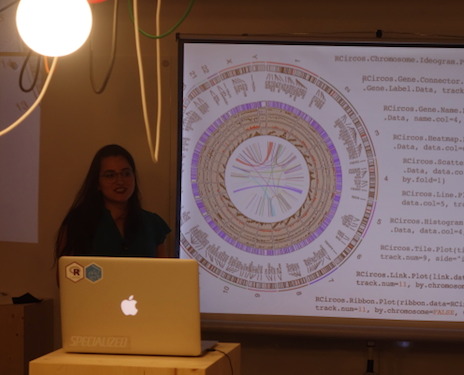I attended one of the first R-Ladies meetup and I liked the dynamics of the meeting.
In June, Liza Darrous gave a talk entitled “Talking in Circos - circular visualisation in R” and introduced us to the package Rcircos.
R-Ladies Lausanne: What is the work that you do?
Liza Darrous: I’m a master student, and I’m currently working with statistical biology and a bit of method development.
RLL: What do you use R for at work?
LD: Pretty much everything! To read data, load data, run algorithms and scripts, maths even.
RLL: Where and when did you learn R?
LD: I learned it in my first year of Bachelor degree. We had to take a statistics course and that’s when I first learned R. It was really nice, my eyes opened!
RLL: For you, what is the most important quality to be a good R-user?
LD: The ability to use Google or any other search engine, because it’s a very open-source project and there is a big online community. And there are so many packages that you can’t keep track of, so you need to be able to find what you need.
RLL: Do you use R outside work?
LD: I did try to use R once to create a database of all the movies I watched and all the movies I wanted to watch.
RLL: Woh, that’s cool! Did you use the random() function to decide which movie you should watch next?
LD: Yes, exactly. It was for me and my family, we were always fighting about what movie we wanted to watch, so that solved the case!
RLL: What are your favourite R tools?
LD: I think I am most proud of using the package dplyr, because it took a lot to learn, it has a very steep learning curve, I’m not even done yet but I do like the functionality of it. And I like the random() function, I use it a lot, I set seeds with it.
RLL: What resources do you use when you get stuck?
LD: Google, and definitely stackoverflow. I once had to go for a Google Group for some specific package, and it was another different experience, because you can’t upvote or downvote so you get all the bad and the good answers.
RLL: What do you aspire to learn in R?
LD: I do want to make my own package. I always had this in the back of my head, to make a functioning package.
RLL: Do you already know what you would like to include in this package?
LD: My bachelors’s project, I think. I was kind of motivated to turn it into a package, it was doing combinations of SNPs, trying to see whether they fit through different logic gates for example. And that could easily be turned into a package I guess, but I just never truly found the motivation nor the time.
RLL: What motivated you to give a talk at R-Ladies Lausanne?
LD: I liked the theme, there were thundeR talks, so not a lot of pressure and the possibility to choose any package that I liked. So I chose Rcircos because I worked with it for a long time and I was pretty much confortable with it. I attended one of the first R-Ladies meetup and I liked the dynamics of the meeting.

RLL: Was it a good experience for you?
LD: It was a really great experience. It was one of my first public speaking events in Lausanne, for a group of people who were actually very nice, very enthusiastic. And apparently they went out of the room having learnt something, that was very cool.
RLL: Anything you want to add?
LD: I would like to thank R-Ladies for this opportunity. And I am very happy to be part of the group. I hope to hear and probably give more talks in the future!